-
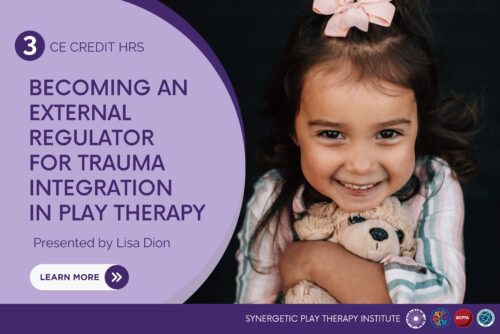 Research in neuroscience and interpersonal neurobiology sheds light on the need for the play therapist to act as the external regulator supporting the child to move towards the intensity they are experiencing allowing for integration. This 3 hour video course explores this need during trauma integration for two primary reasons: 1) The child need to borrow the play therapist’s regulatory capacity as they work through their traumatic thoughts, feelings and sensations in play therapy and 2) The play therapist’s ability to regulate themselves during the intensity increases the capacity for presence and attunement with the child, while simultaneously supporting the health and longevity of their own nervous system. Without the ability of the play therapist to become the external regulator for the intensity that arises during trauma integration, both the child and the play therapist are at risk for emotional flooding and high levels of dysregulation in their nervous systems. Over time, this can significantly impact a play therapist’s longevity in the field, as well as the ability to stay attuned and present to a child in sessions. This course is a recording of a 3 hour live webinar with Trusted Provider Network. See course details below.
Research in neuroscience and interpersonal neurobiology sheds light on the need for the play therapist to act as the external regulator supporting the child to move towards the intensity they are experiencing allowing for integration. This 3 hour video course explores this need during trauma integration for two primary reasons: 1) The child need to borrow the play therapist’s regulatory capacity as they work through their traumatic thoughts, feelings and sensations in play therapy and 2) The play therapist’s ability to regulate themselves during the intensity increases the capacity for presence and attunement with the child, while simultaneously supporting the health and longevity of their own nervous system. Without the ability of the play therapist to become the external regulator for the intensity that arises during trauma integration, both the child and the play therapist are at risk for emotional flooding and high levels of dysregulation in their nervous systems. Over time, this can significantly impact a play therapist’s longevity in the field, as well as the ability to stay attuned and present to a child in sessions. This course is a recording of a 3 hour live webinar with Trusted Provider Network. See course details below. -
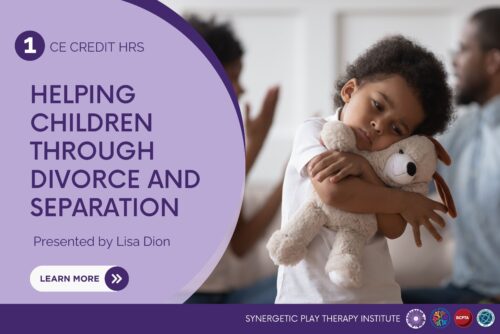 Divorce. The “D” word. The end of the marital road. A happily ever after run amok. It’s something that often gets a bad rap, especially when we think of the children stuck in the middle. But divorce, while it can be devastating to some kids, can also be a relief for others. Children’s perceptions are not all the same. This course explores how to support children in play therapy when they are experiencing divorce and separation.
Divorce. The “D” word. The end of the marital road. A happily ever after run amok. It’s something that often gets a bad rap, especially when we think of the children stuck in the middle. But divorce, while it can be devastating to some kids, can also be a relief for others. Children’s perceptions are not all the same. This course explores how to support children in play therapy when they are experiencing divorce and separation. -
 Discover how playful, nature-themed breathwork can transform your play therapy practice in this engaging one-hour course with Jackie Flynn. Learn to gently guide clients of all ages out of “stuck” survival states, enhancing nervous system flexibility and fostering resilience through co-regulation. This course introduces practical, nature-inspired techniques that blend breathwork and movement to create a felt sense of safety, deepen therapeutic connections, and support clients in accessing emotional regulation. Through shared, playful experiences rooted in nature, you’ll discover how to bring fresh, adaptive interventions into your sessions with your clients.
Discover how playful, nature-themed breathwork can transform your play therapy practice in this engaging one-hour course with Jackie Flynn. Learn to gently guide clients of all ages out of “stuck” survival states, enhancing nervous system flexibility and fostering resilience through co-regulation. This course introduces practical, nature-inspired techniques that blend breathwork and movement to create a felt sense of safety, deepen therapeutic connections, and support clients in accessing emotional regulation. Through shared, playful experiences rooted in nature, you’ll discover how to bring fresh, adaptive interventions into your sessions with your clients. -
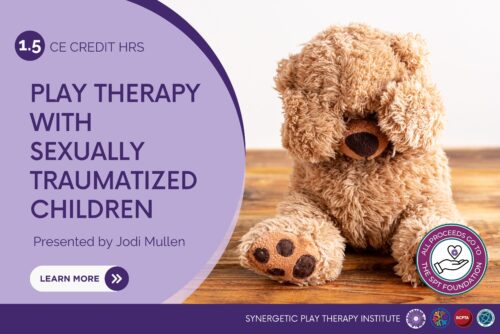 Children who have been sexually traumatized are often in need of our clinical services. Both directive and non-directive play therapy approaches provide these traumatized children with healing and the repair of losses associated with sexual trauma, such as innocence, trust, and appropriate boundaries. In this course you will develop your expertise and become a more effective advocate for your child clients with the knowledge and insight offered through this presentation. You will learn about sexual development in children, the psychological markers of sexual trauma, and the special issues these children present in play therapy, including: consulting with non-offending parents, dealing with the powerful impact of countertransference, and setting limits. Scroll down for all of the course details!
Children who have been sexually traumatized are often in need of our clinical services. Both directive and non-directive play therapy approaches provide these traumatized children with healing and the repair of losses associated with sexual trauma, such as innocence, trust, and appropriate boundaries. In this course you will develop your expertise and become a more effective advocate for your child clients with the knowledge and insight offered through this presentation. You will learn about sexual development in children, the psychological markers of sexual trauma, and the special issues these children present in play therapy, including: consulting with non-offending parents, dealing with the powerful impact of countertransference, and setting limits. Scroll down for all of the course details! -
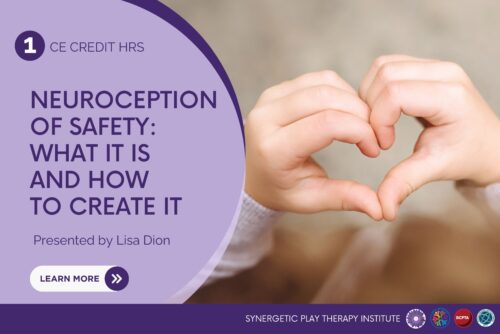 Helping a child heal involves helping them be themselves. One of the best ways to foster this type of environment is to cultivate safety. The therapist knowing the playroom is safe is not enough; the child must know it, too. This course explores what a neuroception of safety is and how to create it within the child and yourself.
Helping a child heal involves helping them be themselves. One of the best ways to foster this type of environment is to cultivate safety. The therapist knowing the playroom is safe is not enough; the child must know it, too. This course explores what a neuroception of safety is and how to create it within the child and yourself. -
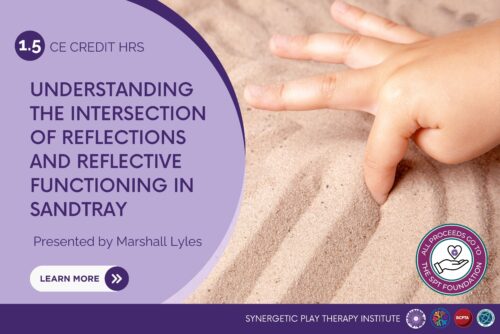 Sandtray therapy prominently features the art of reflecting. In fact, it may be the therapy skill most associated with the craft. However, we can become so accustomed to the language of reflecting that we can lose contact with its intent. In this course, you will explore the skill of reflecting through the lens of the attachment theory concept of reflective functioning. Marshall Lyles will walk you through examples honoring this intersection through use of the sand tray. Scroll down for all of the course details!
Sandtray therapy prominently features the art of reflecting. In fact, it may be the therapy skill most associated with the craft. However, we can become so accustomed to the language of reflecting that we can lose contact with its intent. In this course, you will explore the skill of reflecting through the lens of the attachment theory concept of reflective functioning. Marshall Lyles will walk you through examples honoring this intersection through use of the sand tray. Scroll down for all of the course details! -
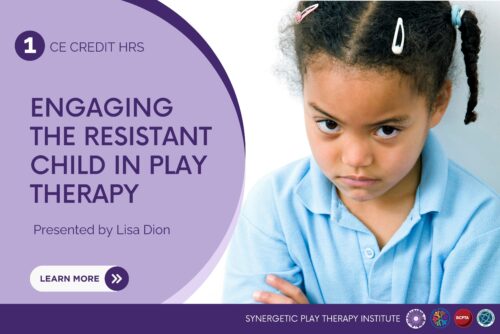 Every therapist has been there – in a session with a child who doesn’t want to come in the room, a child who doesn’t want to do the task, a child who only wants to avoid the issue. This course explores what to do when a child client’s language and behavior say “no.” Join us as we explore resistance- what it is and what it is not. This course will further explore emotional avoidance and flooding as components of resistant behaviors.
Every therapist has been there – in a session with a child who doesn’t want to come in the room, a child who doesn’t want to do the task, a child who only wants to avoid the issue. This course explores what to do when a child client’s language and behavior say “no.” Join us as we explore resistance- what it is and what it is not. This course will further explore emotional avoidance and flooding as components of resistant behaviors. -
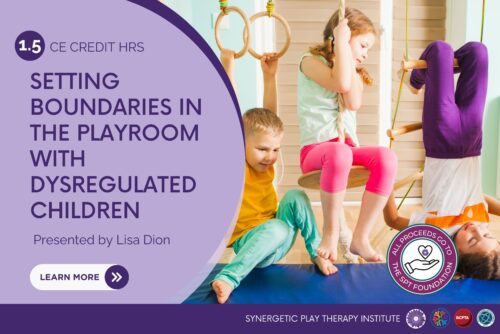 This course supports play therapists as they learn about setting boundaries from a neurobiological perspective, keeping the child’s brain and nervous system activation in mind! Drawing from Interpersonal Neurobiology and Synergetic Play Therapy, participants will learn how to set boundaries without shaming the child or stopping the child’s play, allowing for deeper integration and connection. Working with emotional flooding (the child’s and the therapist’s) will also be explored. Please scroll down for course details.
This course supports play therapists as they learn about setting boundaries from a neurobiological perspective, keeping the child’s brain and nervous system activation in mind! Drawing from Interpersonal Neurobiology and Synergetic Play Therapy, participants will learn how to set boundaries without shaming the child or stopping the child’s play, allowing for deeper integration and connection. Working with emotional flooding (the child’s and the therapist’s) will also be explored. Please scroll down for course details. -
 Aggression and death are common parts of the play therapy process, yet many therapists don’t have a clear understanding of what to do and how to facilitate intensity. This can lead to inadvertently promoting aggression and low brain disorganization. It can also lead to the therapist feeling beat up, exhausted, and hyper-aroused, ultimately impacting their ability to stay attuned, remain present, and find inspiration in this field. Enter Synergetic Play Therapy! Through an SPT lens, and a heavy dose of neuroscience, this 2-hour course helps therapists learn how to use play in a way that supports regulation – their own and their client’s! See course details below.
Aggression and death are common parts of the play therapy process, yet many therapists don’t have a clear understanding of what to do and how to facilitate intensity. This can lead to inadvertently promoting aggression and low brain disorganization. It can also lead to the therapist feeling beat up, exhausted, and hyper-aroused, ultimately impacting their ability to stay attuned, remain present, and find inspiration in this field. Enter Synergetic Play Therapy! Through an SPT lens, and a heavy dose of neuroscience, this 2-hour course helps therapists learn how to use play in a way that supports regulation – their own and their client’s! See course details below. -
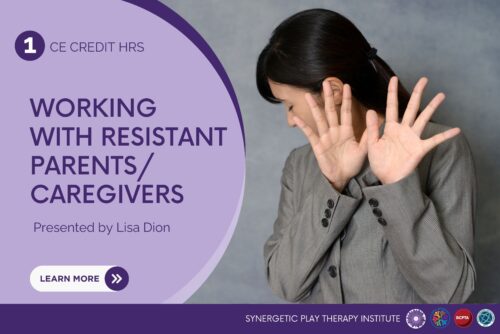 From the dad with doubts to the mom with mixed emotions, not all parents are sold on the idea of play therapy. The resistant parent is a parent who may have questions, shame, or confusion about the process. This course explores how to encourage parental understanding of the power of play and why it’s a key step in helping children heal.
From the dad with doubts to the mom with mixed emotions, not all parents are sold on the idea of play therapy. The resistant parent is a parent who may have questions, shame, or confusion about the process. This course explores how to encourage parental understanding of the power of play and why it’s a key step in helping children heal. -
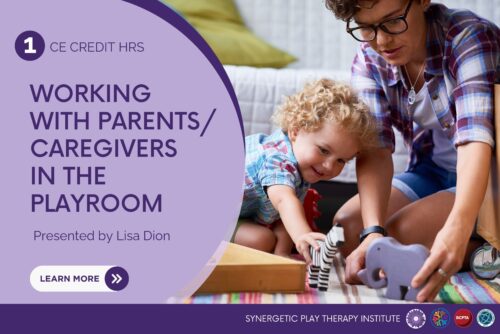 Parents are the most important allies of the play therapist. But forming this alliance requires time, understanding, and lots of communication. It also requires congruence, adaptability, and an appreciation of the parents’ authentic selves. Parents and play therapists are on the same team with one common goal: promote healing for a struggling child. This one-hour home study course explores this play therapy pact.
Parents are the most important allies of the play therapist. But forming this alliance requires time, understanding, and lots of communication. It also requires congruence, adaptability, and an appreciation of the parents’ authentic selves. Parents and play therapists are on the same team with one common goal: promote healing for a struggling child. This one-hour home study course explores this play therapy pact. -
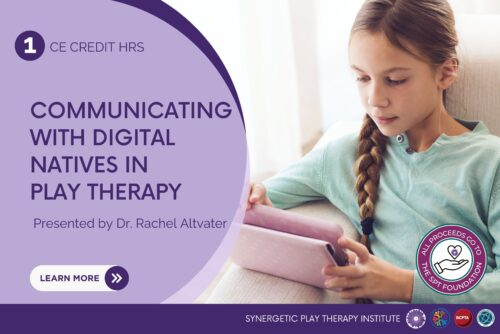 In today’s digital era, children’s play has expanded into new realms, where they engage, connect, and communicate in transformative ways. To support young clients effectively, play therapists must understand and embrace the evolving world of digital play. This insightful course with Dr. Rachel Altvater explores how the digital landscape shapes children’s engagement, self-expression, and identity. Starting with a reflection on your own perspectives about digital native culture, you’ll dive into how digital environments influence children and adolescents, equipping you to meet them where they are. Through practical strategies, you’ll learn to connect with clients in their digital spaces, foster meaningful therapeutic relationships, and seamlessly integrate digital tools into your play therapy practice. The session also examines the vital role of digital identity, uncovering how this space serves as more than entertainment—it’s where young clients form relationships, build resilience and navigate their world. By the end of this course, you’ll walk away with fresh insights and actionable techniques to strengthen the therapeutic alliance, deepen connections, and achieve meaningful outcomes with the digital natives you serve.
In today’s digital era, children’s play has expanded into new realms, where they engage, connect, and communicate in transformative ways. To support young clients effectively, play therapists must understand and embrace the evolving world of digital play. This insightful course with Dr. Rachel Altvater explores how the digital landscape shapes children’s engagement, self-expression, and identity. Starting with a reflection on your own perspectives about digital native culture, you’ll dive into how digital environments influence children and adolescents, equipping you to meet them where they are. Through practical strategies, you’ll learn to connect with clients in their digital spaces, foster meaningful therapeutic relationships, and seamlessly integrate digital tools into your play therapy practice. The session also examines the vital role of digital identity, uncovering how this space serves as more than entertainment—it’s where young clients form relationships, build resilience and navigate their world. By the end of this course, you’ll walk away with fresh insights and actionable techniques to strengthen the therapeutic alliance, deepen connections, and achieve meaningful outcomes with the digital natives you serve.

